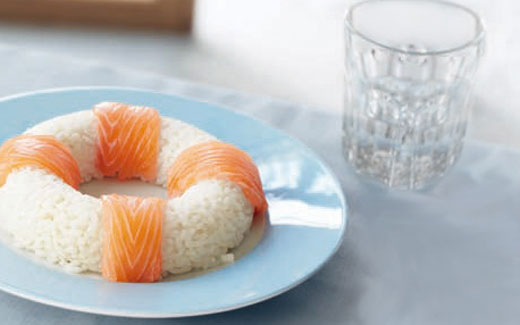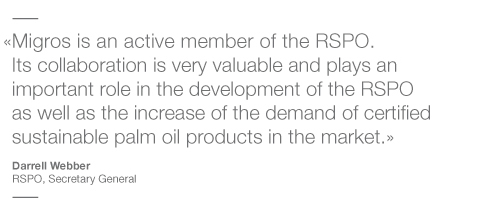
Procuring Raw Materials in a green and fair Way
Migros is also making progress with the sustainable procurement of raw materials outside its label programmes. A significant milestone was that cotton grown to Better Cotton standards was added to the textile value-added chain for the first time at the end of 2011.
Migros takes responsibility along the entire production chain, i.e. also during the procurement and production of raw materials: in the meadow, in the field, on the pasture, in the sea. When ecological or social problems in the areas of agriculture and fishing need to be addressed, the retailer is committed at the grass roots level and works together with producers on better solutions – be it in own projects or as part of international initiatives.
Palm oil
When growing oil palm trees, rainforests are often destroyed and the rights of the local population are abused. To stop such predatory exploitation, the WWF has called round tables together with other organisations. Migros was involved in the establishment of the Round Table on Sustainable Palm Oil RSPO in 2003. Migros has supported the production of sustainable palm oil since 2008 by buying certificates. Migros got top marks in the palm oil rating of the WWF in 2011 and ranks as one of the top companies of the 132 businesses surveyed in Europe, Australia and Japan. Migros is now going a step further and decided last year to no longer cover the palm oil need of M-Industrie over certificates, but to gradually switch to «Segregated Quality». This means that the industrial enterprises purchase palm oil from Swiss importers and processors which procure physically sustainable, RSPO-certified palm oil. In doing so, Migros promotes the direct flow of sustainable palm oil. The target is to use only physically sustainable palm oil in M-Industrie by the end of 2015.
Soya
Soya is a central raw material for the production of feed for farm animals. Due to the growing meat consumption, soya production has doubled globally to 230 million tonnes over the past 20 years. This has social and ecological consequences, for instance the destruction of rainforests and savannah areas. To prevent such grievances, Migros has been a member of the Round Table on Responsible Soy Association since 2010. This international association of distributors, producers and environmental organisations promotes the sustainable production of soya. At a national level, farming associations such as Suisseporcs, Bio Suisse and IP-Suisse as well as soya importers, feed producers and retailers formed a Swiss soya network in 2011. The members have committed themselves to increasing the proportion of sustainable and GM-free soya in farm animal feed in Switzerland from today's 60% to 90% by 2014.
Cotton
Cotton is one of the most important and most common agricultural products globally. At the same time, the fibre is a delicate product due to the high water consumption and pesticide use. In 2009 Migros established the Better Cotton Initiative (BCI) together with other companies and the WWF. This initiative aims to achieve ecological and social improvements in traditional cotton cultivation in addition to organic cotton. In 2011 Migros conducted negotiations with suppliers from southern India, and at the end of the year, cotton cultivated in accordance with the Better Cotton criteria entered Migros' textile value-added chain. As of mid-2012, the retailer will sell the first clothes made out of BCI cotton, but they will not be labelled specifically. In 2012 Migros will establish a BCI farm project in India in cooperation with one of its local clothes suppliers and train some 250 small-scale farmers in the cultivation of Better Cotton produce. The cotton harvest from this project is expected in 2013.
Coffee, tea and cocoa
To promote the sustainable cultivation of coffee, tea and cocoa, Migros has relied on Utz Certified since 2010. This is a globally active, independent certification programme which promotes professional cultivation practices. It provides farmers with agricultural expertise so that they can increase their yield, improve the quality of the produce and simultaneously protect the environment. At the end of 2010, Migros switched its entire basic coffee range to Utz Certified (excluding organic, Max Havelaar, Selection and M-Budget). Migros Catering and Migrolino now also offer Utz-certified coffee. Migros won the Swiss Ethics Award in 2011 for the comprehensive switching of its basic coffee range. The retailer is currently also switching cocoa to Utz Certified: Utz-certified chocolate and breakfast drinks have been available since the beginning of 2012. The entire Chocolate Frey chocolate range is to be switched by the end of 2013. Various kinds of tea are also to be offered as Utz-certified already in autumn 2012. At www.migros.ch/coffee UtZ-certified coffee products can be traced back to the producer.
Fish
Never before has so much fish and seafood been eaten in Switzerland: in only three years, per-capita consumption has grown by 25% to nearly 9 kg. This is increasing the pressure on global fish stocks. As a member of the WWF Seafood Group, Migros has committed itself to gradually switching its fish range to sustainably managed stocks and environmentally friendly fisheries. The retailer has been systematically removing endangered species from its range since 2009. In parallel, Migros is gradually expanding its range of organic and MSC fish. MSC stands for Marine Stewardship Council, promotes sustainable fishing and is the most important label for wild fish. Six fish species were removed from the range in 2011, including red mullet, lemon sole, dragon head and scallops, and 7 MSC products as well as 2 organic products newly added. Migros now supports the establishment of the Aquaculture Stewardship Council (ASC). This standard, which is in line with the MSC, promotes sustainably managed fisheries.